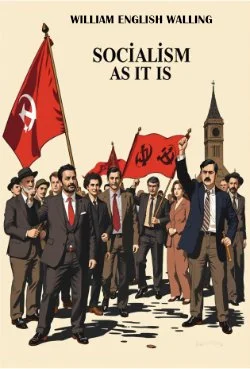By William English Walling (Author), Colin Heston (Introduction)
William English Walling’s Socialism As It Is: A Survey of the World-Wide Revolutionary Movement is a landmark work in early 20th-century political thought, offering a penetrating and pragmatic analysis of the global socialist movement at a time when it was rapidly gaining momentum. Published in 1912, the book stands apart from many contemporary treatments of socialism by refusing to rely solely on abstract theory or ideological polemic. Instead, Walling grounds his analysis in the lived realities, organizational structures, and political strategies of socialist parties and labor movements across the world. His goal is not to speculate on what socialism might become, but to examine what socialism already is—how it functions, how it evolves, and how it interacts with the broader forces of capitalism, democracy, and industrial society.
From the outset, Walling makes clear that his focus is on the practical socialism of organized movements, not the utopian visions or doctrinal purity of theorists. He critiques both the uncritical idealism of some socialist writers and the dismissive caricatures offered by opponents of socialism. Instead, he insists that socialism must be understood through its actions—through the decisions made in party congresses, the resolutions passed by labor unions, and the policies pursued by socialist representatives in parliaments and municipalities. This empirical approach allows Walling to present socialism not as a monolith, but as a dynamic and multifaceted phenomenon, shaped by national contexts, historical contingencies, and internal debates.
Ultimately, Socialism As It Is is a work of both scholarship and advocacy. Walling writes with the conviction that socialism is not only a viable political force but a necessary one, capable of addressing the deep inequalities and instabilities of modern industrial society. Yet he is also clear-eyed about the challenges the movement faces—from internal divisions to external repression, from ideological rigidity to political compromise. His introduction sets the tone for a book that is both analytical and engaged, offering readers a nuanced and grounded understanding of socialism not as a distant ideal, but as a living, evolving force in the world.
Read-Me.Org Inc. New York-Philadelphia-Australia. 2025. 361p.








